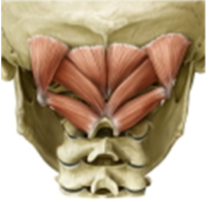Personal trainers, physiotherapists, doctors, rehabilitation experts and even many chiropractors commonly ignore strengthening the 2 most important muscles in your body….
We know that these two muscles are the most important because they contain the highest density of muscle spindles. (Muscle spindles are stretch receptors within the body of a muscle that primarily detect changes in the length of the muscle. The purpose of muscle spindles is to protect your body from injury caused by over-stretching and to maintain muscle tone)
Common muscles we focus on in the gym are the Latissmus Dorsi (lats). This muscle has 1.4 muscle spindles per gram of muscle tissue. The big thick muscles at the top of our shoulders, the trapezius, have 2.2 muscle spindles per gram of muscle tissue.
The muscles that you and your personal trainer ignore actually have 242 and 190 muscle spindles per gram of muscle tissue!!!!! These muscles are the inferior oblique and superior oblique muscle (Pictured).

These muscles are at the base of your skull and help to hold your head upright and keep your eyes level with the horizon. The fact that they have a hundred times the concentration of muscle spindles than most other muscles tells us that this is by far the most important job your muscles must do. Lack of strength in these upper neck muscles throws your whole body posture out of balance and can have a large detrimental effect on your brain health and overall wellbeing as well.
To understand the importance of these muscles you need to look at a young baby. What is one of the most important things a baby needs to do in the first 4 months of its life?

…It needs to be able to lift its head up and keep its head level! That’s why they recommend lots of “tummy time” for babies. If they do not develop the strength of these neck muscles, they can’t sit up and they can’t stand or walk!
These upper neck muscles provide the brain 90% of the information which is required to sit, stand, walk and move. If these muscles aren’t as strong as they should be there is a 90% you are going to be experiencing some kind of problems walking, sitting, standing or moving. I have fund clinically that at least 95% of the people I check have signs of weakness of these important muscles.
But most trainers, physios, doctors and chiros don’t even test these muscles to see if they are strong!
If you haven’t already, make sure to ask Dr Lanthois to check the strength of your upper neck muscles and to show you how to strengthen them if they are weak.
